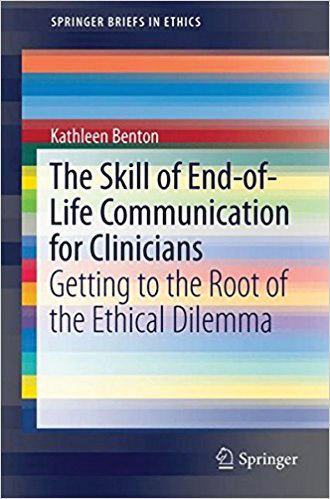BY: REVIEWED BY FR. MYLES N. SHEEHAN, SJ, MD


The Skill of End-of-Life Communication for Clinicians: Getting to the Root of the Ethical Dilemma
By Kathleen Benton, DrPh
Springer Briefs in Ethics, 2017 81 pages, $54.99
How often have we heard that it is too difficult and time consuming to make the effort to speak with patients and families when they are facing a life-limiting illness? Although there is no doubt that time pressures in contemporary health care are enormous, and the need to be productive and efficient is real, the amount of time expended when these conversations are not held, or are done without candor and accuracy, belies our concerns about the lack of time to listen carefully and speak with clarity, compassion and honesty. The deeper truth is that these conversations test our inner selves by forcing us to face mortality, uncertainty, strong emotions and, sometimes, the challenging and difficult behaviors of those for whom we care.
Kathleen Benton's book on end-of-life communication provides a deeply personal, practical and wise approach to these conversations. The subtitle, Getting to the Root of the Ethical Dilemma, has a double meaning. It is an ethical imperative to speak clearly and assist people with informed decision-making.
Benton's approach suggests, accurately, that there is a big ethical problem when clinicians and other caregivers do not speak clearly about the end of life, or they give misleading or confusing descriptions. The other meaning of ethical dilemma in end-of-life conversations can also be decisions to seek further treatment, remove or withhold life-sustaining technology, or demands for what seems like futile care. Benton points out that telling a patient with clearly progressing, widespread metastatic cancer that there is an effective chemotherapeutic treatment, because it has demonstrated to provide days to weeks more life, and not making it clear that the person is dying and has a greatly limited life expectancy, is as much a dilemma as the more common concerns about whether we should start or stop a treatment.
Part of the engaging nature of the book is Benton's description of her relationship with her brother Daniel, who had a lifelong struggle with Proteus syndrome (elephant man disease), and whose journey through multiple hospitalizations and harrowing decisions about treatment until his death serves as a deeply personal illustration of ethical decision-making and communication. Along with the openness and vulnerability that Benton reveals in sharing her family story, equally engaging is the book's tone. It is written by someone who understands personally the need for honest discussions, as well as the challenges. This is not a dry collection of ethical case analyses. It is the work of a deeply committed and wise professional who is not afraid to share her experience and point of view.
The book combines vividly written clinical examples, guides for conversation, tips on facilitating best practices, ethical analysis and Benton's personal insight. She writes clearly about the medicalization of death, the vulnerability of different patient populations, the specifics of 19 well-chosen and challenging cases and the skills necessary for clear communication.
Although the book is invaluable for physicians, its audience is wider and should include all who care for persons with serious illness. This underscores a key point of Benton's that the skill of end-of-life communication requires a coordinated and well-functioning group of caregivers so that patients and family are not bewildered and mislead by conflicting and fragmentary conversations.
This book is timely and should be required reading for ethics consultants and members of ethics committees. It also would serve well as a resource book for training of health care professionals, and it is a very helpful guide and refresher for even the seasoned clinician who seeks to do his or her best in communicating with patients who are at the end of life.
FR. MYLES N. SHEEHAN, SJ, is provincial assistant for senior Jesuits, Maryland and Northeast USA.